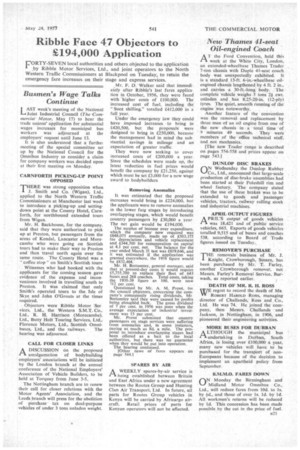Ribble Face 47 Objectors to £194,000 Application
Page 55

If you've noticed an error in this article please click here to report it so we can fix it.
Busmen's Wage Talks • Continue
FORTY-SEVEN local authorities and others objected to the application by Ribble Motor Services, Ltd., and joint operators to the North Western Traffic Commissioners at Blackpool on Tuesday, to retain the emergency fare increases on their stage and express services. .,Mr. F. D. Walker said that irnmedi ately after Ribbles last fares applica. lion in October, 1956, they were faced with 'higher costs of £100,000. The increased cost of fuel, including the Suez shilling." totalled £412,000 in a full year.
Under the emergency law they could have imposed increases to bring in £420,500, but the proposals were designed to bring in £250,000, because the management had in mind the substantial savings in mileage and an expectation of greater traffic.
They were now seeking to covet increased costs of £200,000 a year. Since the schedules were made up, the latest reduction in fuel prices would benefit the company by £21,250, against which must be set £3,000 for a new wage award to bodybuilders
Removing Anomalies
It was estimated that the proposed increases would bring in £224,000, but the applicants were to remove anomalies in the lower fare stages by introducing overlapping stages, which would benefit country passengers by £30,000 a year The net gain would be £194,000.
The surplus of income over expenditure, which the company now required was £848,075 annually, made up of £503.375 for depreciation and vehicle replacement and £344,700 for remuneration on capital at 4.1 per cent. net. The balance for the year ended March 31 last was £819,646, and it was estimated if the application was granted everywhere, the 1958 figure would be £832,404.
Mr. H. Bottomley, general manager, said that at present-day costs it would require E5,755,700 to replace their fleet of 643 buses and 268 coaches. Total costs, taking the 1938-39 figure as 100, were now 112 per cent.
Questioned by Mr. A. M. Presst, for the council objectors, concerning the company's consistently rising dividends, Mr. Bottomley said they were caused by profits being ploughed back. The gross dividend of 7 per cent. in 1956 was poor when the average expectation of industrial investment was 15 per cent. Mr. Presst submitted that country passengers on stage services were suffering from anomalies and, in some instances, paying as much as 8d. a mile. The proposal to introduce overlapping stages had been offered as a bait to the local authorities, but there was no guarantee when they would be put into operation.
The hearing continued.
[Other news of fares appears on page 544.1
SPARES BY AIR
A WEEKLY spares-by-air service is r-k being established between Britain and East Africa under a new agreement between the Rootes Group and Hunting Clan Air Transport, Ltd. In future, all parts for Rootes Group vehicles in Kenya will be carried by Africargo aircraft. Retail prices of parts for Kenyan operators will not be affected.








































































































































